TAFE NSW CHCCSM004: Coordinate Complex Case Requirements Assignment
VerifiedAdded on 2023/01/11
|9
|3911
|64
Homework Assignment
AI Summary
This assignment solution addresses case studies from the CHCCSM004 unit, focusing on coordinating complex case requirements in community services. The document provides detailed answers to three case studies involving clients with diverse needs: an elderly woman with multiple health issues, a young mother in an unstable relationship, and a refugee with a mild brain injury. The solutions cover key aspects of case management, including person-centered approaches, developing case management plans, referral options, coordination role requirements, mandatory reporting, addressing mistrust, prioritizing client needs, case management meetings, cultural considerations, communication strategies, service duplication prevention, and progress monitoring. The assignment demonstrates an understanding of client assessment, service planning, and effective communication strategies within a community services context.
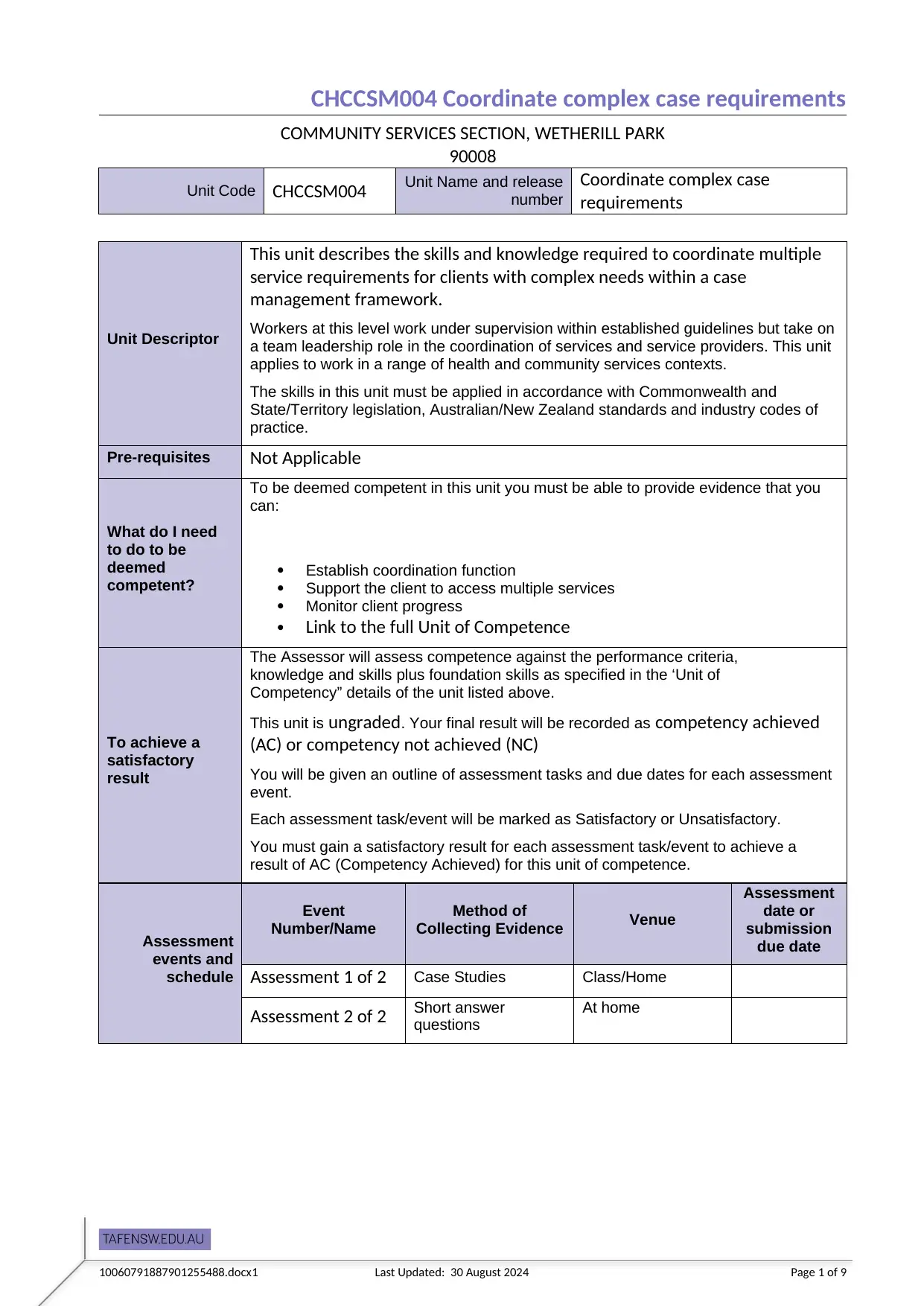
CHCCSM004 Coordinate complex case requirements
COMMUNITY SERVICES SECTION, WETHERILL PARK
90008
Unit Code CHCCSM004 Unit Name and release
number
Coordinate complex case
requirements
Unit Descriptor
This unit describes the skills and knowledge required to coordinate multiple
service requirements for clients with complex needs within a case
management framework.
Workers at this level work under supervision within established guidelines but take on
a team leadership role in the coordination of services and service providers. This unit
applies to work in a range of health and community services contexts.
The skills in this unit must be applied in accordance with Commonwealth and
State/Territory legislation, Australian/New Zealand standards and industry codes of
practice.
Pre-requisites Not Applicable
What do I need
to do to be
deemed
competent?
To be deemed competent in this unit you must be able to provide evidence that you
can:
Establish coordination function
Support the client to access multiple services
Monitor client progress
Link to the full Unit of Competence
To achieve a
satisfactory
result
The Assessor will assess competence against the performance criteria,
knowledge and skills plus foundation skills as specified in the ‘Unit of
Competency” details of the unit listed above.
This unit is ungraded. Your final result will be recorded as competency achieved
(AC) or competency not achieved (NC)
You will be given an outline of assessment tasks and due dates for each assessment
event.
Each assessment task/event will be marked as Satisfactory or Unsatisfactory.
You must gain a satisfactory result for each assessment task/event to achieve a
result of AC (Competency Achieved) for this unit of competence.
Assessment
events and
schedule
Event
Number/Name
Method of
Collecting Evidence Venue
Assessment
date or
submission
due date
Assessment 1 of 2 Case Studies Class/Home
Assessment 2 of 2 Short answer
questions
At home
10060791887901255488.docx1 Last Updated: 30 August 2024 Page 1 of 9
COMMUNITY SERVICES SECTION, WETHERILL PARK
90008
Unit Code CHCCSM004 Unit Name and release
number
Coordinate complex case
requirements
Unit Descriptor
This unit describes the skills and knowledge required to coordinate multiple
service requirements for clients with complex needs within a case
management framework.
Workers at this level work under supervision within established guidelines but take on
a team leadership role in the coordination of services and service providers. This unit
applies to work in a range of health and community services contexts.
The skills in this unit must be applied in accordance with Commonwealth and
State/Territory legislation, Australian/New Zealand standards and industry codes of
practice.
Pre-requisites Not Applicable
What do I need
to do to be
deemed
competent?
To be deemed competent in this unit you must be able to provide evidence that you
can:
Establish coordination function
Support the client to access multiple services
Monitor client progress
Link to the full Unit of Competence
To achieve a
satisfactory
result
The Assessor will assess competence against the performance criteria,
knowledge and skills plus foundation skills as specified in the ‘Unit of
Competency” details of the unit listed above.
This unit is ungraded. Your final result will be recorded as competency achieved
(AC) or competency not achieved (NC)
You will be given an outline of assessment tasks and due dates for each assessment
event.
Each assessment task/event will be marked as Satisfactory or Unsatisfactory.
You must gain a satisfactory result for each assessment task/event to achieve a
result of AC (Competency Achieved) for this unit of competence.
Assessment
events and
schedule
Event
Number/Name
Method of
Collecting Evidence Venue
Assessment
date or
submission
due date
Assessment 1 of 2 Case Studies Class/Home
Assessment 2 of 2 Short answer
questions
At home
10060791887901255488.docx1 Last Updated: 30 August 2024 Page 1 of 9
Paraphrase This Document
Need a fresh take? Get an instant paraphrase of this document with our AI Paraphraser
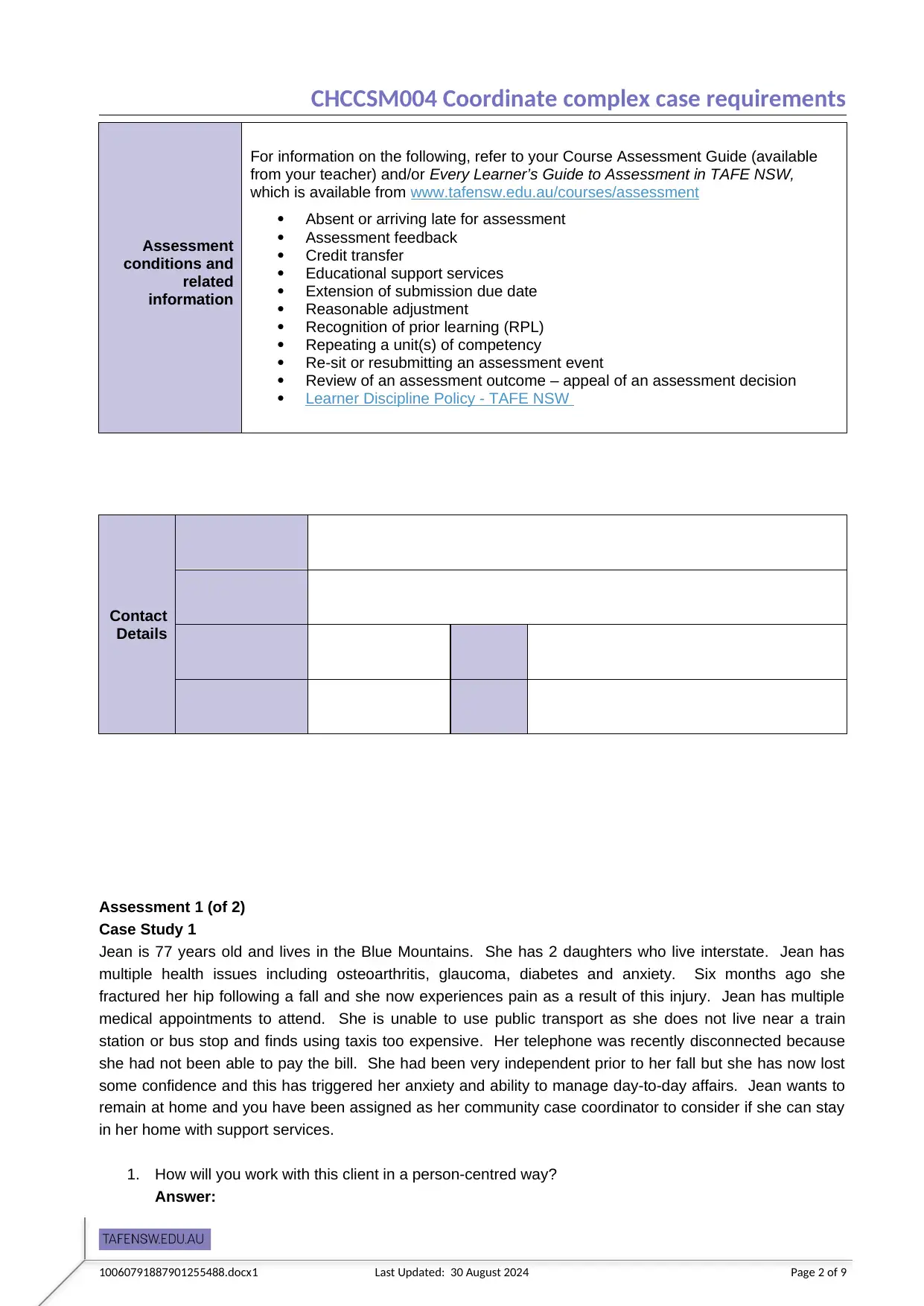
CHCCSM004 Coordinate complex case requirements
Assessment
conditions and
related
information
For information on the following, refer to your Course Assessment Guide (available
from your teacher) and/or Every Learner’s Guide to Assessment in TAFE NSW,
which is available from www.tafensw.edu.au/courses/assessment
Absent or arriving late for assessment
Assessment feedback
Credit transfer
Educational support services
Extension of submission due date
Reasonable adjustment
Recognition of prior learning (RPL)
Repeating a unit(s) of competency
Re-sit or resubmitting an assessment event
Review of an assessment outcome – appeal of an assessment decision
Learner Discipline Policy - TAFE NSW
Contact
Details
Assessment 1 (of 2)
Case Study 1
Jean is 77 years old and lives in the Blue Mountains. She has 2 daughters who live interstate. Jean has
multiple health issues including osteoarthritis, glaucoma, diabetes and anxiety. Six months ago she
fractured her hip following a fall and she now experiences pain as a result of this injury. Jean has multiple
medical appointments to attend. She is unable to use public transport as she does not live near a train
station or bus stop and finds using taxis too expensive. Her telephone was recently disconnected because
she had not been able to pay the bill. She had been very independent prior to her fall but she has now lost
some confidence and this has triggered her anxiety and ability to manage day-to-day affairs. Jean wants to
remain at home and you have been assigned as her community case coordinator to consider if she can stay
in her home with support services.
1. How will you work with this client in a person-centred way?
Answer:
10060791887901255488.docx1 Last Updated: 30 August 2024 Page 2 of 9
Assessment
conditions and
related
information
For information on the following, refer to your Course Assessment Guide (available
from your teacher) and/or Every Learner’s Guide to Assessment in TAFE NSW,
which is available from www.tafensw.edu.au/courses/assessment
Absent or arriving late for assessment
Assessment feedback
Credit transfer
Educational support services
Extension of submission due date
Reasonable adjustment
Recognition of prior learning (RPL)
Repeating a unit(s) of competency
Re-sit or resubmitting an assessment event
Review of an assessment outcome – appeal of an assessment decision
Learner Discipline Policy - TAFE NSW
Contact
Details
Assessment 1 (of 2)
Case Study 1
Jean is 77 years old and lives in the Blue Mountains. She has 2 daughters who live interstate. Jean has
multiple health issues including osteoarthritis, glaucoma, diabetes and anxiety. Six months ago she
fractured her hip following a fall and she now experiences pain as a result of this injury. Jean has multiple
medical appointments to attend. She is unable to use public transport as she does not live near a train
station or bus stop and finds using taxis too expensive. Her telephone was recently disconnected because
she had not been able to pay the bill. She had been very independent prior to her fall but she has now lost
some confidence and this has triggered her anxiety and ability to manage day-to-day affairs. Jean wants to
remain at home and you have been assigned as her community case coordinator to consider if she can stay
in her home with support services.
1. How will you work with this client in a person-centred way?
Answer:
10060791887901255488.docx1 Last Updated: 30 August 2024 Page 2 of 9
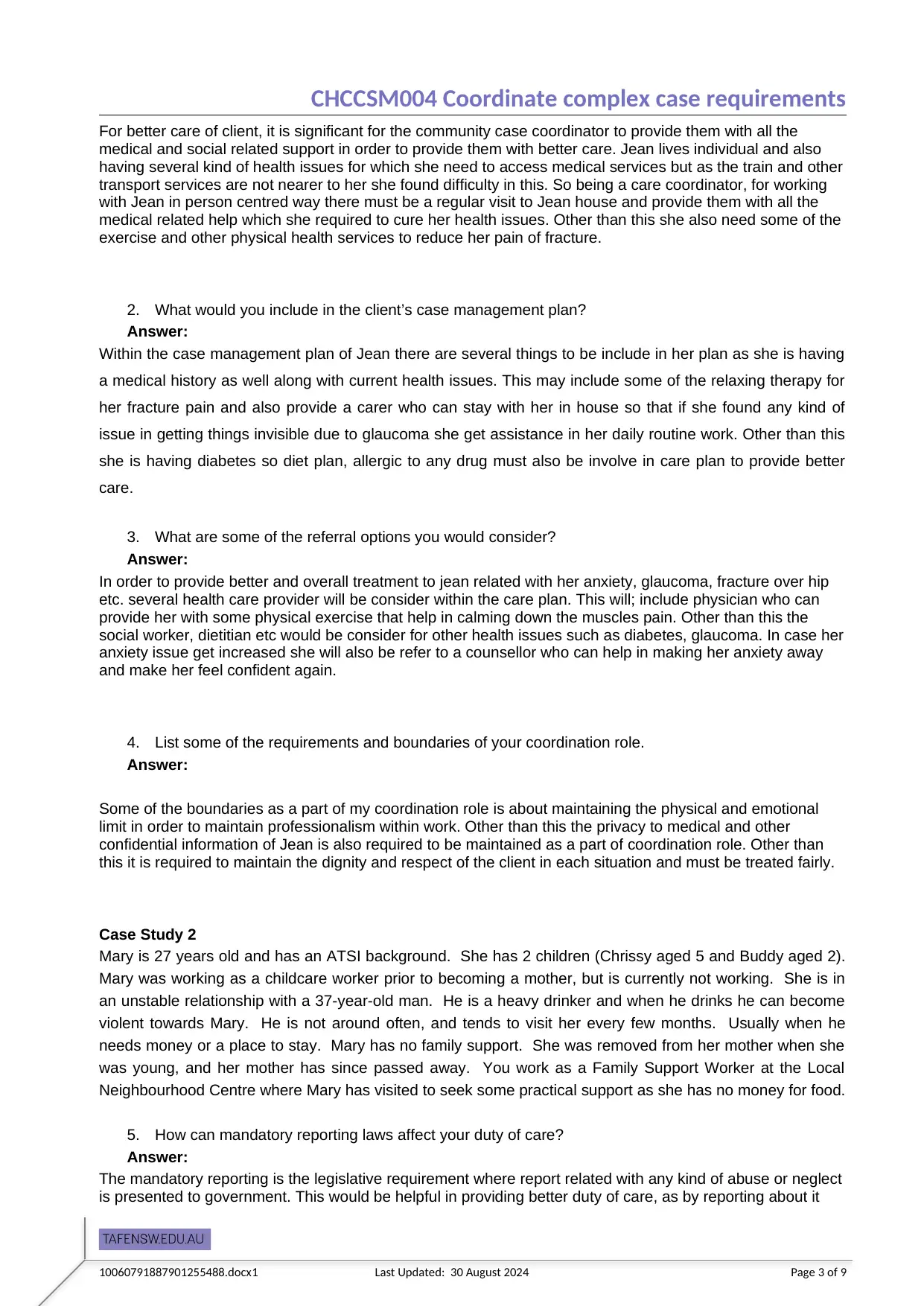
CHCCSM004 Coordinate complex case requirements
For better care of client, it is significant for the community case coordinator to provide them with all the
medical and social related support in order to provide them with better care. Jean lives individual and also
having several kind of health issues for which she need to access medical services but as the train and other
transport services are not nearer to her she found difficulty in this. So being a care coordinator, for working
with Jean in person centred way there must be a regular visit to Jean house and provide them with all the
medical related help which she required to cure her health issues. Other than this she also need some of the
exercise and other physical health services to reduce her pain of fracture.
2. What would you include in the client’s case management plan?
Answer:
Within the case management plan of Jean there are several things to be include in her plan as she is having
a medical history as well along with current health issues. This may include some of the relaxing therapy for
her fracture pain and also provide a carer who can stay with her in house so that if she found any kind of
issue in getting things invisible due to glaucoma she get assistance in her daily routine work. Other than this
she is having diabetes so diet plan, allergic to any drug must also be involve in care plan to provide better
care.
3. What are some of the referral options you would consider?
Answer:
In order to provide better and overall treatment to jean related with her anxiety, glaucoma, fracture over hip
etc. several health care provider will be consider within the care plan. This will; include physician who can
provide her with some physical exercise that help in calming down the muscles pain. Other than this the
social worker, dietitian etc would be consider for other health issues such as diabetes, glaucoma. In case her
anxiety issue get increased she will also be refer to a counsellor who can help in making her anxiety away
and make her feel confident again.
4. List some of the requirements and boundaries of your coordination role.
Answer:
Some of the boundaries as a part of my coordination role is about maintaining the physical and emotional
limit in order to maintain professionalism within work. Other than this the privacy to medical and other
confidential information of Jean is also required to be maintained as a part of coordination role. Other than
this it is required to maintain the dignity and respect of the client in each situation and must be treated fairly.
Case Study 2
Mary is 27 years old and has an ATSI background. She has 2 children (Chrissy aged 5 and Buddy aged 2).
Mary was working as a childcare worker prior to becoming a mother, but is currently not working. She is in
an unstable relationship with a 37-year-old man. He is a heavy drinker and when he drinks he can become
violent towards Mary. He is not around often, and tends to visit her every few months. Usually when he
needs money or a place to stay. Mary has no family support. She was removed from her mother when she
was young, and her mother has since passed away. You work as a Family Support Worker at the Local
Neighbourhood Centre where Mary has visited to seek some practical support as she has no money for food.
5. How can mandatory reporting laws affect your duty of care?
Answer:
The mandatory reporting is the legislative requirement where report related with any kind of abuse or neglect
is presented to government. This would be helpful in providing better duty of care, as by reporting about it
10060791887901255488.docx1 Last Updated: 30 August 2024 Page 3 of 9
For better care of client, it is significant for the community case coordinator to provide them with all the
medical and social related support in order to provide them with better care. Jean lives individual and also
having several kind of health issues for which she need to access medical services but as the train and other
transport services are not nearer to her she found difficulty in this. So being a care coordinator, for working
with Jean in person centred way there must be a regular visit to Jean house and provide them with all the
medical related help which she required to cure her health issues. Other than this she also need some of the
exercise and other physical health services to reduce her pain of fracture.
2. What would you include in the client’s case management plan?
Answer:
Within the case management plan of Jean there are several things to be include in her plan as she is having
a medical history as well along with current health issues. This may include some of the relaxing therapy for
her fracture pain and also provide a carer who can stay with her in house so that if she found any kind of
issue in getting things invisible due to glaucoma she get assistance in her daily routine work. Other than this
she is having diabetes so diet plan, allergic to any drug must also be involve in care plan to provide better
care.
3. What are some of the referral options you would consider?
Answer:
In order to provide better and overall treatment to jean related with her anxiety, glaucoma, fracture over hip
etc. several health care provider will be consider within the care plan. This will; include physician who can
provide her with some physical exercise that help in calming down the muscles pain. Other than this the
social worker, dietitian etc would be consider for other health issues such as diabetes, glaucoma. In case her
anxiety issue get increased she will also be refer to a counsellor who can help in making her anxiety away
and make her feel confident again.
4. List some of the requirements and boundaries of your coordination role.
Answer:
Some of the boundaries as a part of my coordination role is about maintaining the physical and emotional
limit in order to maintain professionalism within work. Other than this the privacy to medical and other
confidential information of Jean is also required to be maintained as a part of coordination role. Other than
this it is required to maintain the dignity and respect of the client in each situation and must be treated fairly.
Case Study 2
Mary is 27 years old and has an ATSI background. She has 2 children (Chrissy aged 5 and Buddy aged 2).
Mary was working as a childcare worker prior to becoming a mother, but is currently not working. She is in
an unstable relationship with a 37-year-old man. He is a heavy drinker and when he drinks he can become
violent towards Mary. He is not around often, and tends to visit her every few months. Usually when he
needs money or a place to stay. Mary has no family support. She was removed from her mother when she
was young, and her mother has since passed away. You work as a Family Support Worker at the Local
Neighbourhood Centre where Mary has visited to seek some practical support as she has no money for food.
5. How can mandatory reporting laws affect your duty of care?
Answer:
The mandatory reporting is the legislative requirement where report related with any kind of abuse or neglect
is presented to government. This would be helpful in providing better duty of care, as by reporting about it
10060791887901255488.docx1 Last Updated: 30 August 2024 Page 3 of 9
⊘ This is a preview!⊘
Do you want full access?
Subscribe today to unlock all pages.

Trusted by 1+ million students worldwide
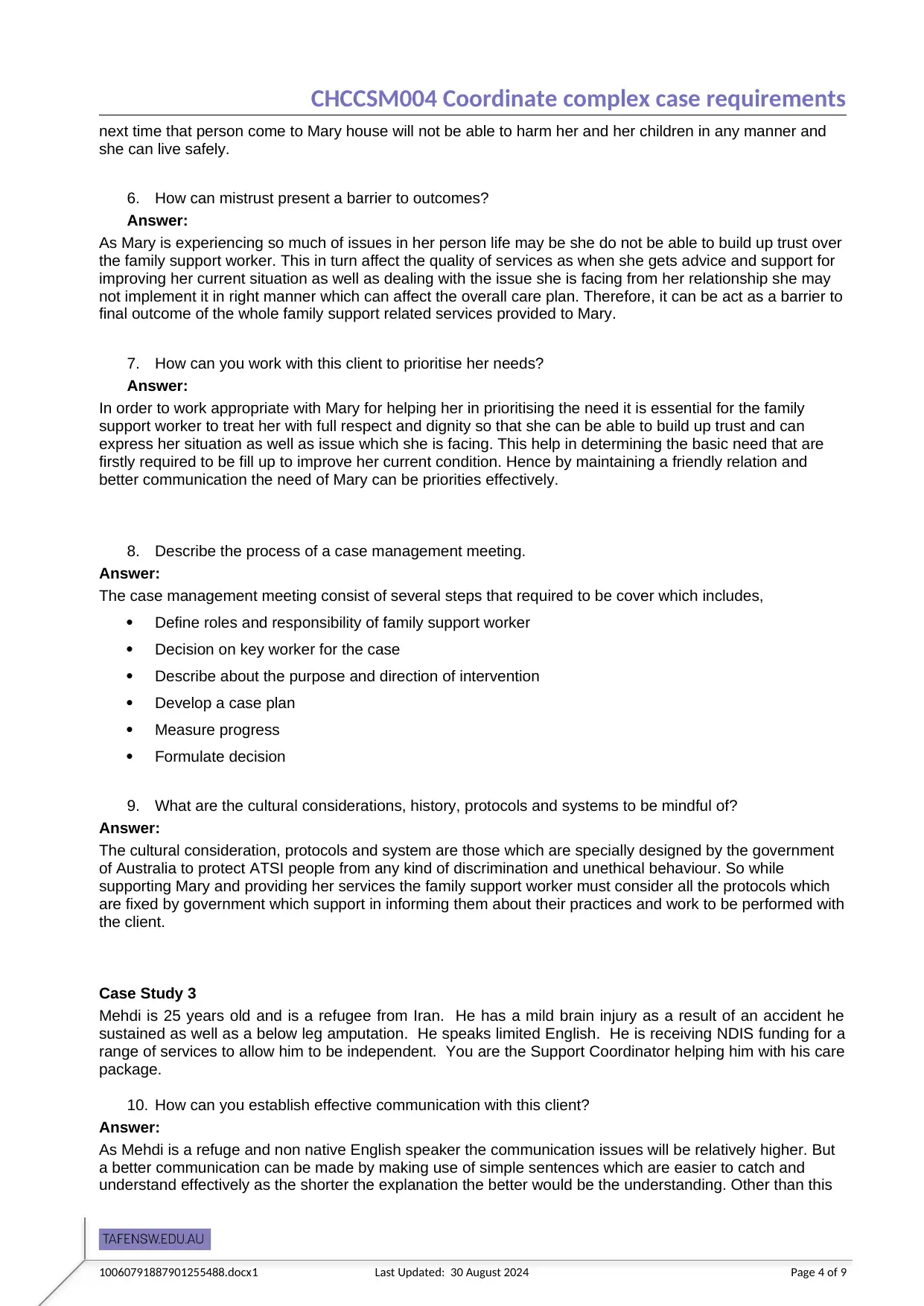
CHCCSM004 Coordinate complex case requirements
next time that person come to Mary house will not be able to harm her and her children in any manner and
she can live safely.
6. How can mistrust present a barrier to outcomes?
Answer:
As Mary is experiencing so much of issues in her person life may be she do not be able to build up trust over
the family support worker. This in turn affect the quality of services as when she gets advice and support for
improving her current situation as well as dealing with the issue she is facing from her relationship she may
not implement it in right manner which can affect the overall care plan. Therefore, it can be act as a barrier to
final outcome of the whole family support related services provided to Mary.
7. How can you work with this client to prioritise her needs?
Answer:
In order to work appropriate with Mary for helping her in prioritising the need it is essential for the family
support worker to treat her with full respect and dignity so that she can be able to build up trust and can
express her situation as well as issue which she is facing. This help in determining the basic need that are
firstly required to be fill up to improve her current condition. Hence by maintaining a friendly relation and
better communication the need of Mary can be priorities effectively.
8. Describe the process of a case management meeting.
Answer:
The case management meeting consist of several steps that required to be cover which includes,
Define roles and responsibility of family support worker
Decision on key worker for the case
Describe about the purpose and direction of intervention
Develop a case plan
Measure progress
Formulate decision
9. What are the cultural considerations, history, protocols and systems to be mindful of?
Answer:
The cultural consideration, protocols and system are those which are specially designed by the government
of Australia to protect ATSI people from any kind of discrimination and unethical behaviour. So while
supporting Mary and providing her services the family support worker must consider all the protocols which
are fixed by government which support in informing them about their practices and work to be performed with
the client.
Case Study 3
Mehdi is 25 years old and is a refugee from Iran. He has a mild brain injury as a result of an accident he
sustained as well as a below leg amputation. He speaks limited English. He is receiving NDIS funding for a
range of services to allow him to be independent. You are the Support Coordinator helping him with his care
package.
10. How can you establish effective communication with this client?
Answer:
As Mehdi is a refuge and non native English speaker the communication issues will be relatively higher. But
a better communication can be made by making use of simple sentences which are easier to catch and
understand effectively as the shorter the explanation the better would be the understanding. Other than this
10060791887901255488.docx1 Last Updated: 30 August 2024 Page 4 of 9
next time that person come to Mary house will not be able to harm her and her children in any manner and
she can live safely.
6. How can mistrust present a barrier to outcomes?
Answer:
As Mary is experiencing so much of issues in her person life may be she do not be able to build up trust over
the family support worker. This in turn affect the quality of services as when she gets advice and support for
improving her current situation as well as dealing with the issue she is facing from her relationship she may
not implement it in right manner which can affect the overall care plan. Therefore, it can be act as a barrier to
final outcome of the whole family support related services provided to Mary.
7. How can you work with this client to prioritise her needs?
Answer:
In order to work appropriate with Mary for helping her in prioritising the need it is essential for the family
support worker to treat her with full respect and dignity so that she can be able to build up trust and can
express her situation as well as issue which she is facing. This help in determining the basic need that are
firstly required to be fill up to improve her current condition. Hence by maintaining a friendly relation and
better communication the need of Mary can be priorities effectively.
8. Describe the process of a case management meeting.
Answer:
The case management meeting consist of several steps that required to be cover which includes,
Define roles and responsibility of family support worker
Decision on key worker for the case
Describe about the purpose and direction of intervention
Develop a case plan
Measure progress
Formulate decision
9. What are the cultural considerations, history, protocols and systems to be mindful of?
Answer:
The cultural consideration, protocols and system are those which are specially designed by the government
of Australia to protect ATSI people from any kind of discrimination and unethical behaviour. So while
supporting Mary and providing her services the family support worker must consider all the protocols which
are fixed by government which support in informing them about their practices and work to be performed with
the client.
Case Study 3
Mehdi is 25 years old and is a refugee from Iran. He has a mild brain injury as a result of an accident he
sustained as well as a below leg amputation. He speaks limited English. He is receiving NDIS funding for a
range of services to allow him to be independent. You are the Support Coordinator helping him with his care
package.
10. How can you establish effective communication with this client?
Answer:
As Mehdi is a refuge and non native English speaker the communication issues will be relatively higher. But
a better communication can be made by making use of simple sentences which are easier to catch and
understand effectively as the shorter the explanation the better would be the understanding. Other than this
10060791887901255488.docx1 Last Updated: 30 August 2024 Page 4 of 9
Paraphrase This Document
Need a fresh take? Get an instant paraphrase of this document with our AI Paraphraser
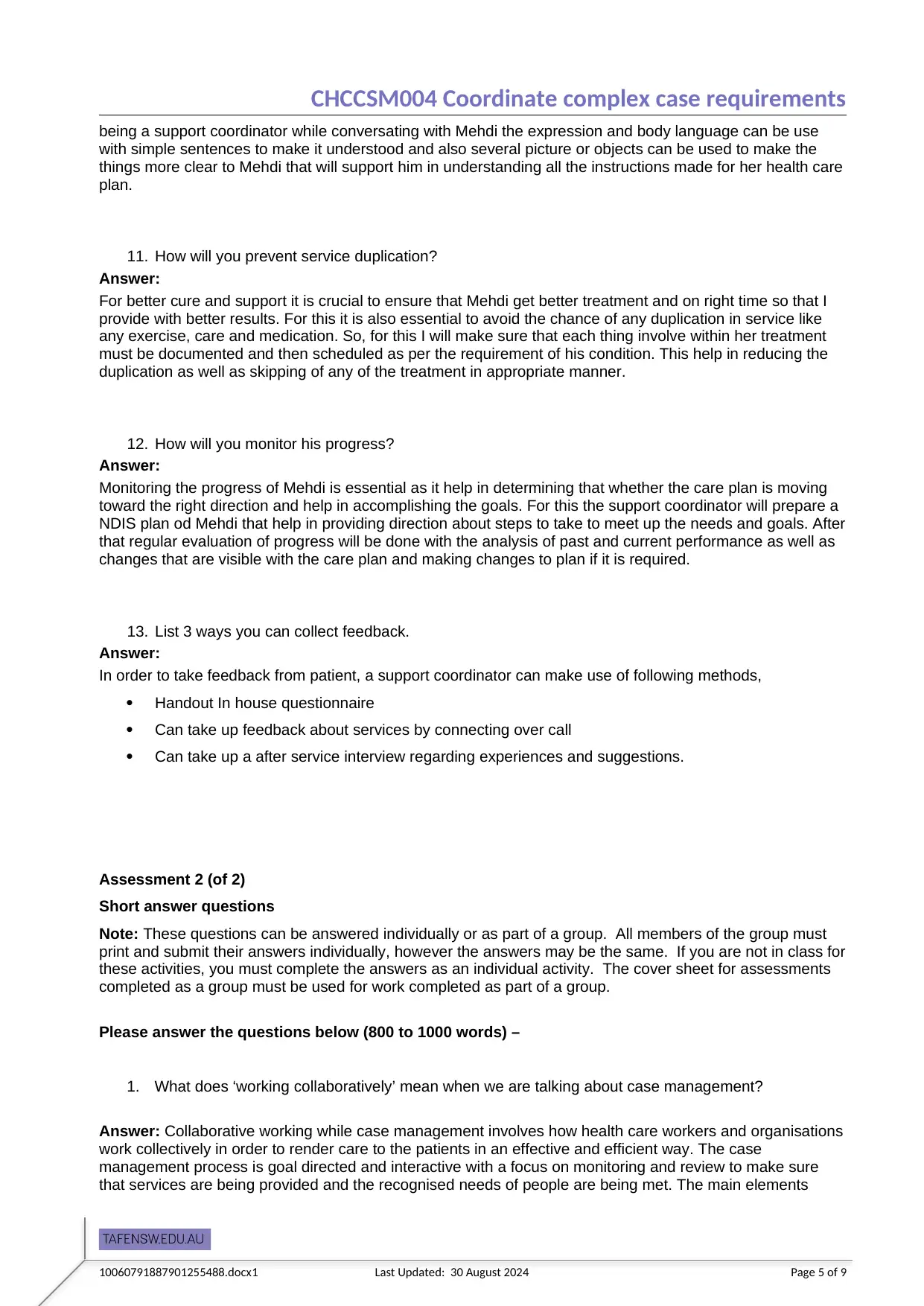
CHCCSM004 Coordinate complex case requirements
being a support coordinator while conversating with Mehdi the expression and body language can be use
with simple sentences to make it understood and also several picture or objects can be used to make the
things more clear to Mehdi that will support him in understanding all the instructions made for her health care
plan.
11. How will you prevent service duplication?
Answer:
For better cure and support it is crucial to ensure that Mehdi get better treatment and on right time so that I
provide with better results. For this it is also essential to avoid the chance of any duplication in service like
any exercise, care and medication. So, for this I will make sure that each thing involve within her treatment
must be documented and then scheduled as per the requirement of his condition. This help in reducing the
duplication as well as skipping of any of the treatment in appropriate manner.
12. How will you monitor his progress?
Answer:
Monitoring the progress of Mehdi is essential as it help in determining that whether the care plan is moving
toward the right direction and help in accomplishing the goals. For this the support coordinator will prepare a
NDIS plan od Mehdi that help in providing direction about steps to take to meet up the needs and goals. After
that regular evaluation of progress will be done with the analysis of past and current performance as well as
changes that are visible with the care plan and making changes to plan if it is required.
13. List 3 ways you can collect feedback.
Answer:
In order to take feedback from patient, a support coordinator can make use of following methods,
Handout In house questionnaire
Can take up feedback about services by connecting over call
Can take up a after service interview regarding experiences and suggestions.
Assessment 2 (of 2)
Short answer questions
Note: These questions can be answered individually or as part of a group. All members of the group must
print and submit their answers individually, however the answers may be the same. If you are not in class for
these activities, you must complete the answers as an individual activity. The cover sheet for assessments
completed as a group must be used for work completed as part of a group.
Please answer the questions below (800 to 1000 words) –
1. What does ‘working collaboratively’ mean when we are talking about case management?
Answer: Collaborative working while case management involves how health care workers and organisations
work collectively in order to render care to the patients in an effective and efficient way. The case
management process is goal directed and interactive with a focus on monitoring and review to make sure
that services are being provided and the recognised needs of people are being met. The main elements
10060791887901255488.docx1 Last Updated: 30 August 2024 Page 5 of 9
being a support coordinator while conversating with Mehdi the expression and body language can be use
with simple sentences to make it understood and also several picture or objects can be used to make the
things more clear to Mehdi that will support him in understanding all the instructions made for her health care
plan.
11. How will you prevent service duplication?
Answer:
For better cure and support it is crucial to ensure that Mehdi get better treatment and on right time so that I
provide with better results. For this it is also essential to avoid the chance of any duplication in service like
any exercise, care and medication. So, for this I will make sure that each thing involve within her treatment
must be documented and then scheduled as per the requirement of his condition. This help in reducing the
duplication as well as skipping of any of the treatment in appropriate manner.
12. How will you monitor his progress?
Answer:
Monitoring the progress of Mehdi is essential as it help in determining that whether the care plan is moving
toward the right direction and help in accomplishing the goals. For this the support coordinator will prepare a
NDIS plan od Mehdi that help in providing direction about steps to take to meet up the needs and goals. After
that regular evaluation of progress will be done with the analysis of past and current performance as well as
changes that are visible with the care plan and making changes to plan if it is required.
13. List 3 ways you can collect feedback.
Answer:
In order to take feedback from patient, a support coordinator can make use of following methods,
Handout In house questionnaire
Can take up feedback about services by connecting over call
Can take up a after service interview regarding experiences and suggestions.
Assessment 2 (of 2)
Short answer questions
Note: These questions can be answered individually or as part of a group. All members of the group must
print and submit their answers individually, however the answers may be the same. If you are not in class for
these activities, you must complete the answers as an individual activity. The cover sheet for assessments
completed as a group must be used for work completed as part of a group.
Please answer the questions below (800 to 1000 words) –
1. What does ‘working collaboratively’ mean when we are talking about case management?
Answer: Collaborative working while case management involves how health care workers and organisations
work collectively in order to render care to the patients in an effective and efficient way. The case
management process is goal directed and interactive with a focus on monitoring and review to make sure
that services are being provided and the recognised needs of people are being met. The main elements
10060791887901255488.docx1 Last Updated: 30 August 2024 Page 5 of 9
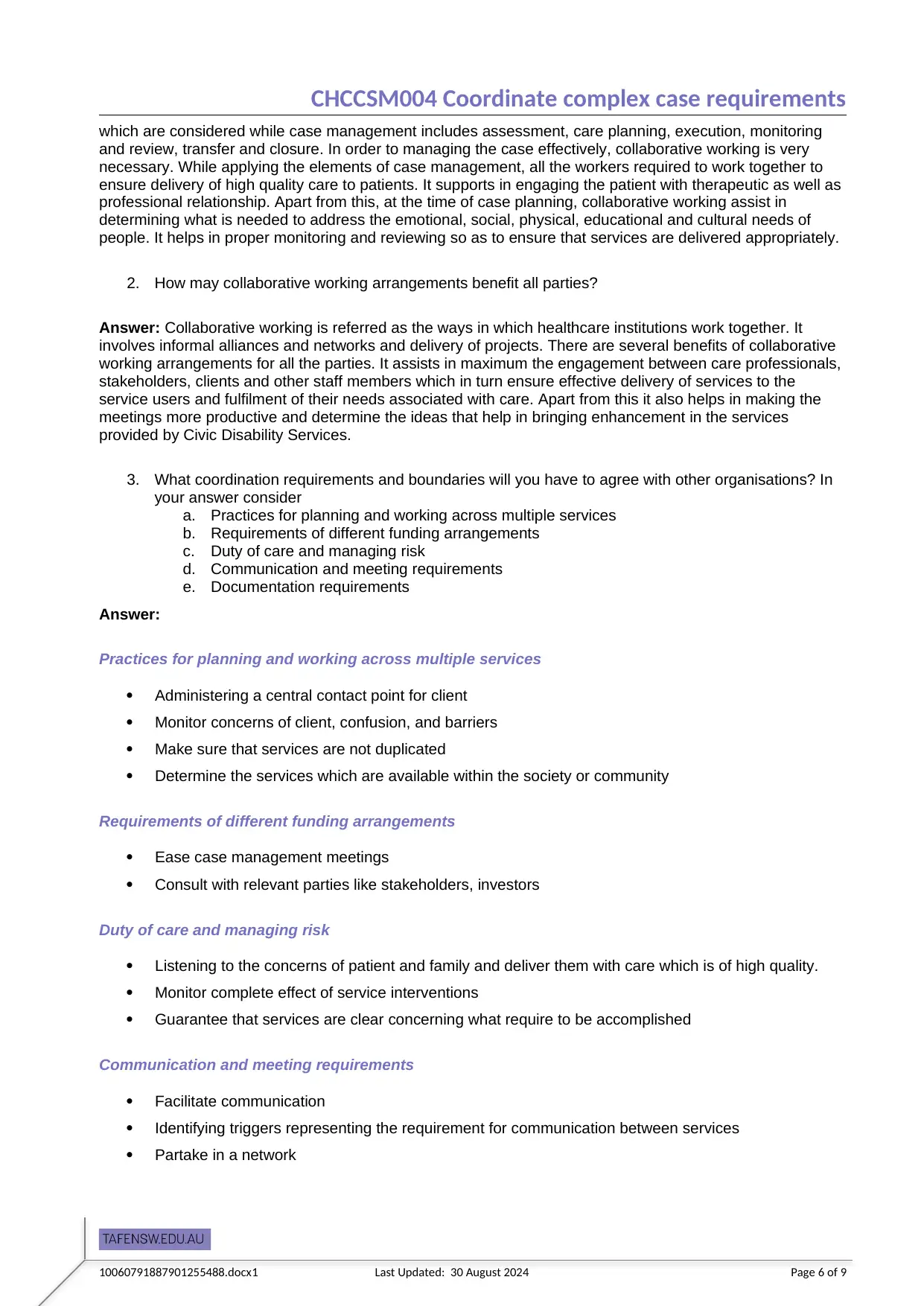
CHCCSM004 Coordinate complex case requirements
which are considered while case management includes assessment, care planning, execution, monitoring
and review, transfer and closure. In order to managing the case effectively, collaborative working is very
necessary. While applying the elements of case management, all the workers required to work together to
ensure delivery of high quality care to patients. It supports in engaging the patient with therapeutic as well as
professional relationship. Apart from this, at the time of case planning, collaborative working assist in
determining what is needed to address the emotional, social, physical, educational and cultural needs of
people. It helps in proper monitoring and reviewing so as to ensure that services are delivered appropriately.
2. How may collaborative working arrangements benefit all parties?
Answer: Collaborative working is referred as the ways in which healthcare institutions work together. It
involves informal alliances and networks and delivery of projects. There are several benefits of collaborative
working arrangements for all the parties. It assists in maximum the engagement between care professionals,
stakeholders, clients and other staff members which in turn ensure effective delivery of services to the
service users and fulfilment of their needs associated with care. Apart from this it also helps in making the
meetings more productive and determine the ideas that help in bringing enhancement in the services
provided by Civic Disability Services.
3. What coordination requirements and boundaries will you have to agree with other organisations? In
your answer consider
a. Practices for planning and working across multiple services
b. Requirements of different funding arrangements
c. Duty of care and managing risk
d. Communication and meeting requirements
e. Documentation requirements
Answer:
Practices for planning and working across multiple services
Administering a central contact point for client
Monitor concerns of client, confusion, and barriers
Make sure that services are not duplicated
Determine the services which are available within the society or community
Requirements of different funding arrangements
Ease case management meetings
Consult with relevant parties like stakeholders, investors
Duty of care and managing risk
Listening to the concerns of patient and family and deliver them with care which is of high quality.
Monitor complete effect of service interventions
Guarantee that services are clear concerning what require to be accomplished
Communication and meeting requirements
Facilitate communication
Identifying triggers representing the requirement for communication between services
Partake in a network
10060791887901255488.docx1 Last Updated: 30 August 2024 Page 6 of 9
which are considered while case management includes assessment, care planning, execution, monitoring
and review, transfer and closure. In order to managing the case effectively, collaborative working is very
necessary. While applying the elements of case management, all the workers required to work together to
ensure delivery of high quality care to patients. It supports in engaging the patient with therapeutic as well as
professional relationship. Apart from this, at the time of case planning, collaborative working assist in
determining what is needed to address the emotional, social, physical, educational and cultural needs of
people. It helps in proper monitoring and reviewing so as to ensure that services are delivered appropriately.
2. How may collaborative working arrangements benefit all parties?
Answer: Collaborative working is referred as the ways in which healthcare institutions work together. It
involves informal alliances and networks and delivery of projects. There are several benefits of collaborative
working arrangements for all the parties. It assists in maximum the engagement between care professionals,
stakeholders, clients and other staff members which in turn ensure effective delivery of services to the
service users and fulfilment of their needs associated with care. Apart from this it also helps in making the
meetings more productive and determine the ideas that help in bringing enhancement in the services
provided by Civic Disability Services.
3. What coordination requirements and boundaries will you have to agree with other organisations? In
your answer consider
a. Practices for planning and working across multiple services
b. Requirements of different funding arrangements
c. Duty of care and managing risk
d. Communication and meeting requirements
e. Documentation requirements
Answer:
Practices for planning and working across multiple services
Administering a central contact point for client
Monitor concerns of client, confusion, and barriers
Make sure that services are not duplicated
Determine the services which are available within the society or community
Requirements of different funding arrangements
Ease case management meetings
Consult with relevant parties like stakeholders, investors
Duty of care and managing risk
Listening to the concerns of patient and family and deliver them with care which is of high quality.
Monitor complete effect of service interventions
Guarantee that services are clear concerning what require to be accomplished
Communication and meeting requirements
Facilitate communication
Identifying triggers representing the requirement for communication between services
Partake in a network
10060791887901255488.docx1 Last Updated: 30 August 2024 Page 6 of 9
⊘ This is a preview!⊘
Do you want full access?
Subscribe today to unlock all pages.

Trusted by 1+ million students worldwide
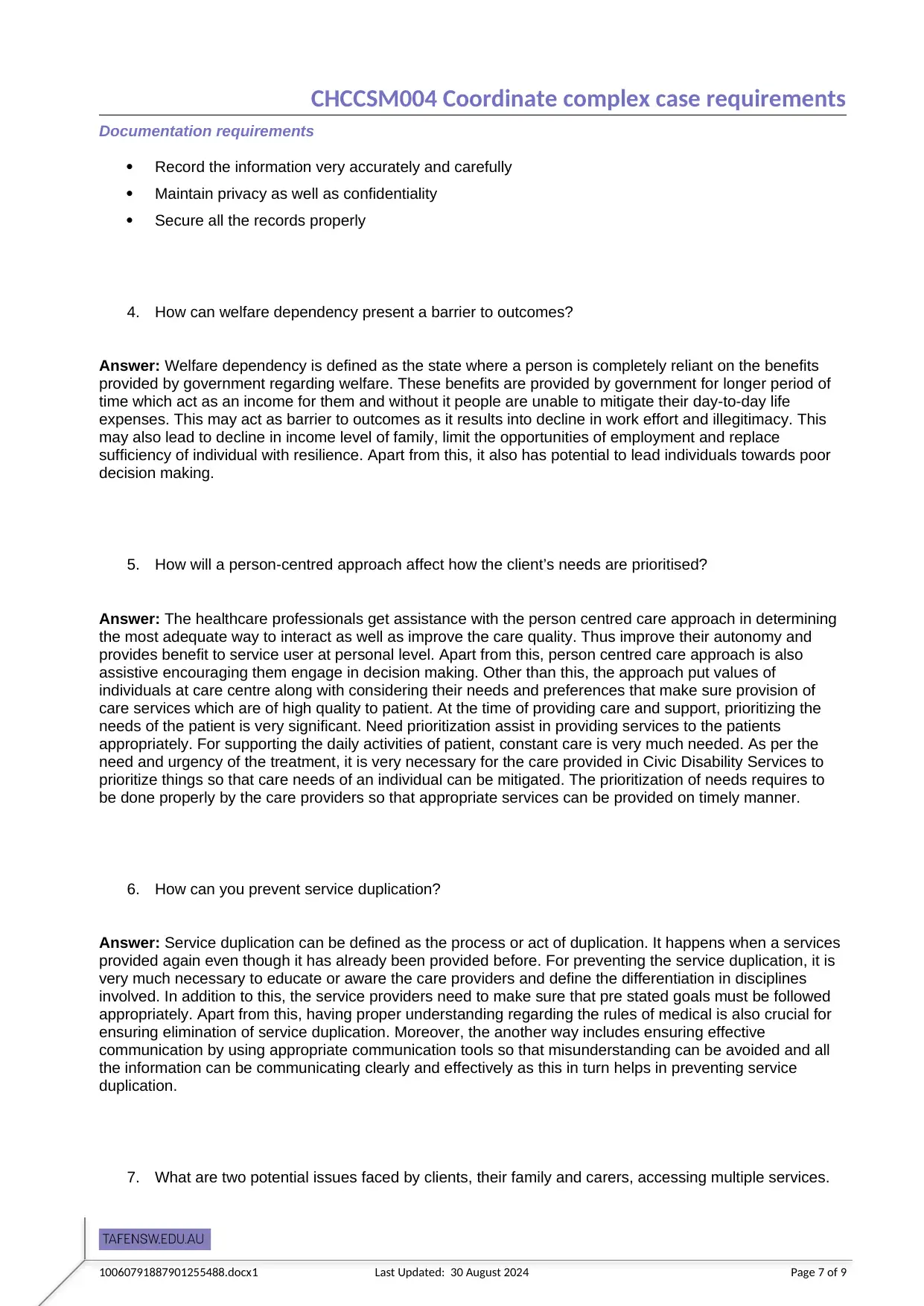
CHCCSM004 Coordinate complex case requirements
Documentation requirements
Record the information very accurately and carefully
Maintain privacy as well as confidentiality
Secure all the records properly
4. How can welfare dependency present a barrier to outcomes?
Answer: Welfare dependency is defined as the state where a person is completely reliant on the benefits
provided by government regarding welfare. These benefits are provided by government for longer period of
time which act as an income for them and without it people are unable to mitigate their day-to-day life
expenses. This may act as barrier to outcomes as it results into decline in work effort and illegitimacy. This
may also lead to decline in income level of family, limit the opportunities of employment and replace
sufficiency of individual with resilience. Apart from this, it also has potential to lead individuals towards poor
decision making.
5. How will a person-centred approach affect how the client’s needs are prioritised?
Answer: The healthcare professionals get assistance with the person centred care approach in determining
the most adequate way to interact as well as improve the care quality. Thus improve their autonomy and
provides benefit to service user at personal level. Apart from this, person centred care approach is also
assistive encouraging them engage in decision making. Other than this, the approach put values of
individuals at care centre along with considering their needs and preferences that make sure provision of
care services which are of high quality to patient. At the time of providing care and support, prioritizing the
needs of the patient is very significant. Need prioritization assist in providing services to the patients
appropriately. For supporting the daily activities of patient, constant care is very much needed. As per the
need and urgency of the treatment, it is very necessary for the care provided in Civic Disability Services to
prioritize things so that care needs of an individual can be mitigated. The prioritization of needs requires to
be done properly by the care providers so that appropriate services can be provided on timely manner.
6. How can you prevent service duplication?
Answer: Service duplication can be defined as the process or act of duplication. It happens when a services
provided again even though it has already been provided before. For preventing the service duplication, it is
very much necessary to educate or aware the care providers and define the differentiation in disciplines
involved. In addition to this, the service providers need to make sure that pre stated goals must be followed
appropriately. Apart from this, having proper understanding regarding the rules of medical is also crucial for
ensuring elimination of service duplication. Moreover, the another way includes ensuring effective
communication by using appropriate communication tools so that misunderstanding can be avoided and all
the information can be communicating clearly and effectively as this in turn helps in preventing service
duplication.
7. What are two potential issues faced by clients, their family and carers, accessing multiple services.
10060791887901255488.docx1 Last Updated: 30 August 2024 Page 7 of 9
Documentation requirements
Record the information very accurately and carefully
Maintain privacy as well as confidentiality
Secure all the records properly
4. How can welfare dependency present a barrier to outcomes?
Answer: Welfare dependency is defined as the state where a person is completely reliant on the benefits
provided by government regarding welfare. These benefits are provided by government for longer period of
time which act as an income for them and without it people are unable to mitigate their day-to-day life
expenses. This may act as barrier to outcomes as it results into decline in work effort and illegitimacy. This
may also lead to decline in income level of family, limit the opportunities of employment and replace
sufficiency of individual with resilience. Apart from this, it also has potential to lead individuals towards poor
decision making.
5. How will a person-centred approach affect how the client’s needs are prioritised?
Answer: The healthcare professionals get assistance with the person centred care approach in determining
the most adequate way to interact as well as improve the care quality. Thus improve their autonomy and
provides benefit to service user at personal level. Apart from this, person centred care approach is also
assistive encouraging them engage in decision making. Other than this, the approach put values of
individuals at care centre along with considering their needs and preferences that make sure provision of
care services which are of high quality to patient. At the time of providing care and support, prioritizing the
needs of the patient is very significant. Need prioritization assist in providing services to the patients
appropriately. For supporting the daily activities of patient, constant care is very much needed. As per the
need and urgency of the treatment, it is very necessary for the care provided in Civic Disability Services to
prioritize things so that care needs of an individual can be mitigated. The prioritization of needs requires to
be done properly by the care providers so that appropriate services can be provided on timely manner.
6. How can you prevent service duplication?
Answer: Service duplication can be defined as the process or act of duplication. It happens when a services
provided again even though it has already been provided before. For preventing the service duplication, it is
very much necessary to educate or aware the care providers and define the differentiation in disciplines
involved. In addition to this, the service providers need to make sure that pre stated goals must be followed
appropriately. Apart from this, having proper understanding regarding the rules of medical is also crucial for
ensuring elimination of service duplication. Moreover, the another way includes ensuring effective
communication by using appropriate communication tools so that misunderstanding can be avoided and all
the information can be communicating clearly and effectively as this in turn helps in preventing service
duplication.
7. What are two potential issues faced by clients, their family and carers, accessing multiple services.
10060791887901255488.docx1 Last Updated: 30 August 2024 Page 7 of 9
Paraphrase This Document
Need a fresh take? Get an instant paraphrase of this document with our AI Paraphraser
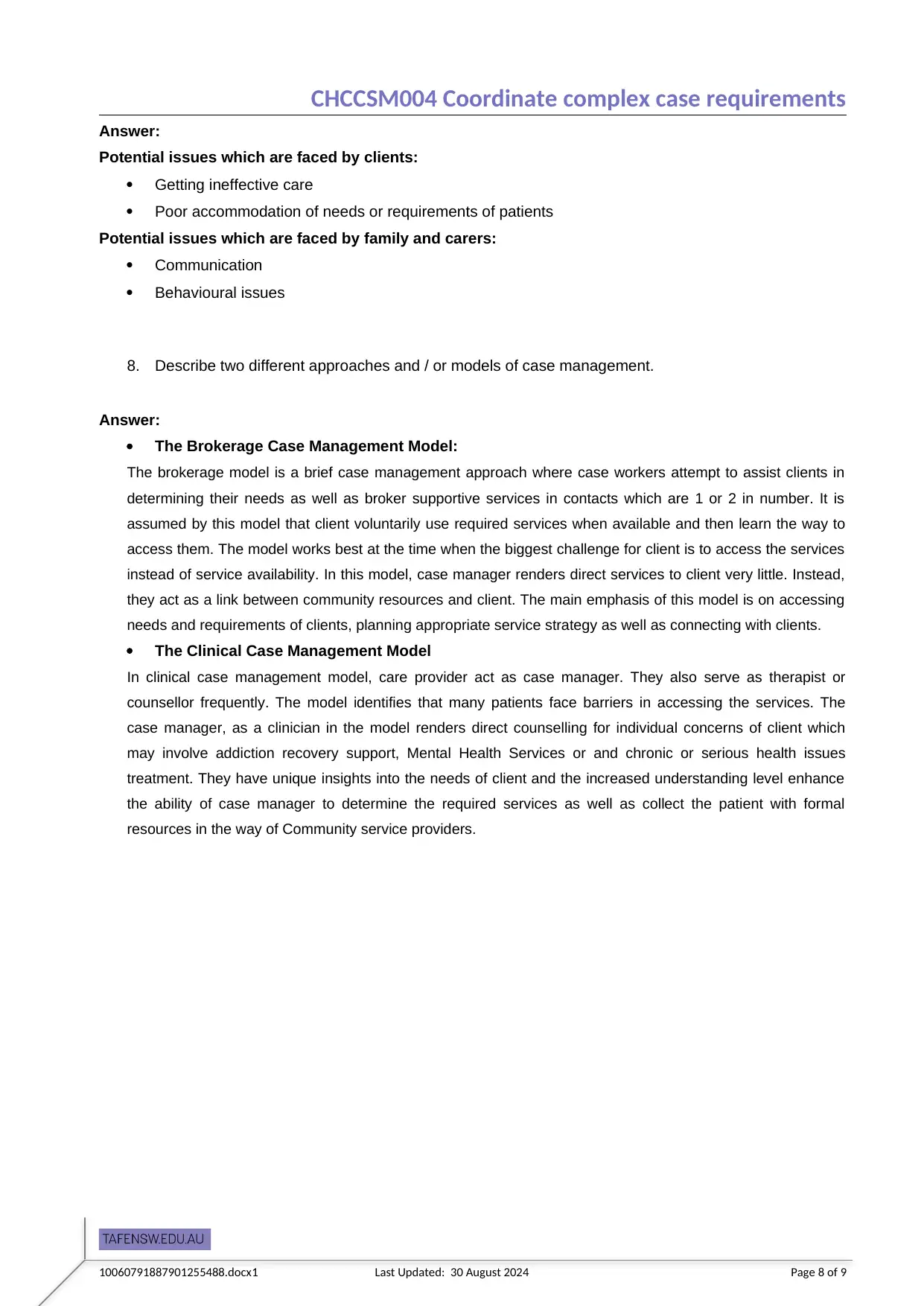
CHCCSM004 Coordinate complex case requirements
Answer:
Potential issues which are faced by clients:
Getting ineffective care
Poor accommodation of needs or requirements of patients
Potential issues which are faced by family and carers:
Communication
Behavioural issues
8. Describe two different approaches and / or models of case management.
Answer:
The Brokerage Case Management Model:
The brokerage model is a brief case management approach where case workers attempt to assist clients in
determining their needs as well as broker supportive services in contacts which are 1 or 2 in number. It is
assumed by this model that client voluntarily use required services when available and then learn the way to
access them. The model works best at the time when the biggest challenge for client is to access the services
instead of service availability. In this model, case manager renders direct services to client very little. Instead,
they act as a link between community resources and client. The main emphasis of this model is on accessing
needs and requirements of clients, planning appropriate service strategy as well as connecting with clients.
The Clinical Case Management Model
In clinical case management model, care provider act as case manager. They also serve as therapist or
counsellor frequently. The model identifies that many patients face barriers in accessing the services. The
case manager, as a clinician in the model renders direct counselling for individual concerns of client which
may involve addiction recovery support, Mental Health Services or and chronic or serious health issues
treatment. They have unique insights into the needs of client and the increased understanding level enhance
the ability of case manager to determine the required services as well as collect the patient with formal
resources in the way of Community service providers.
10060791887901255488.docx1 Last Updated: 30 August 2024 Page 8 of 9
Answer:
Potential issues which are faced by clients:
Getting ineffective care
Poor accommodation of needs or requirements of patients
Potential issues which are faced by family and carers:
Communication
Behavioural issues
8. Describe two different approaches and / or models of case management.
Answer:
The Brokerage Case Management Model:
The brokerage model is a brief case management approach where case workers attempt to assist clients in
determining their needs as well as broker supportive services in contacts which are 1 or 2 in number. It is
assumed by this model that client voluntarily use required services when available and then learn the way to
access them. The model works best at the time when the biggest challenge for client is to access the services
instead of service availability. In this model, case manager renders direct services to client very little. Instead,
they act as a link between community resources and client. The main emphasis of this model is on accessing
needs and requirements of clients, planning appropriate service strategy as well as connecting with clients.
The Clinical Case Management Model
In clinical case management model, care provider act as case manager. They also serve as therapist or
counsellor frequently. The model identifies that many patients face barriers in accessing the services. The
case manager, as a clinician in the model renders direct counselling for individual concerns of client which
may involve addiction recovery support, Mental Health Services or and chronic or serious health issues
treatment. They have unique insights into the needs of client and the increased understanding level enhance
the ability of case manager to determine the required services as well as collect the patient with formal
resources in the way of Community service providers.
10060791887901255488.docx1 Last Updated: 30 August 2024 Page 8 of 9
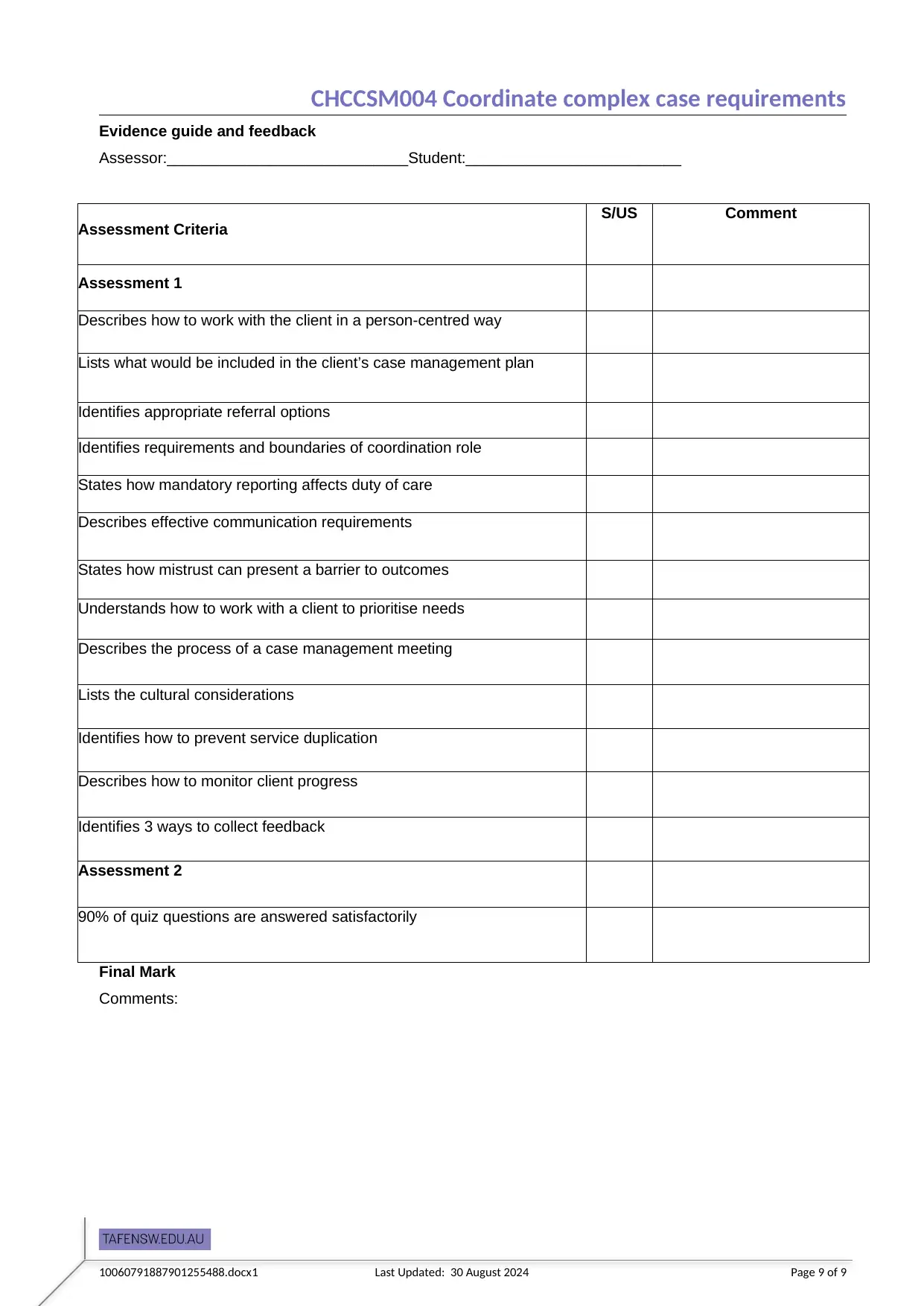
CHCCSM004 Coordinate complex case requirements
Evidence guide and feedback
Assessor:____________________________Student:_________________________
Assessment Criteria
S/US Comment
Assessment 1
Describes how to work with the client in a person-centred way
Lists what would be included in the client’s case management plan
Identifies appropriate referral options
Identifies requirements and boundaries of coordination role
States how mandatory reporting affects duty of care
Describes effective communication requirements
States how mistrust can present a barrier to outcomes
Understands how to work with a client to prioritise needs
Describes the process of a case management meeting
Lists the cultural considerations
Identifies how to prevent service duplication
Describes how to monitor client progress
Identifies 3 ways to collect feedback
Assessment 2
90% of quiz questions are answered satisfactorily
Final Mark
Comments:
10060791887901255488.docx1 Last Updated: 30 August 2024 Page 9 of 9
Evidence guide and feedback
Assessor:____________________________Student:_________________________
Assessment Criteria
S/US Comment
Assessment 1
Describes how to work with the client in a person-centred way
Lists what would be included in the client’s case management plan
Identifies appropriate referral options
Identifies requirements and boundaries of coordination role
States how mandatory reporting affects duty of care
Describes effective communication requirements
States how mistrust can present a barrier to outcomes
Understands how to work with a client to prioritise needs
Describes the process of a case management meeting
Lists the cultural considerations
Identifies how to prevent service duplication
Describes how to monitor client progress
Identifies 3 ways to collect feedback
Assessment 2
90% of quiz questions are answered satisfactorily
Final Mark
Comments:
10060791887901255488.docx1 Last Updated: 30 August 2024 Page 9 of 9
⊘ This is a preview!⊘
Do you want full access?
Subscribe today to unlock all pages.

Trusted by 1+ million students worldwide
1 out of 9
Related Documents
Your All-in-One AI-Powered Toolkit for Academic Success.
+13062052269
info@desklib.com
Available 24*7 on WhatsApp / Email
![[object Object]](/_next/static/media/star-bottom.7253800d.svg)
Unlock your academic potential
Copyright © 2020–2026 A2Z Services. All Rights Reserved. Developed and managed by ZUCOL.





